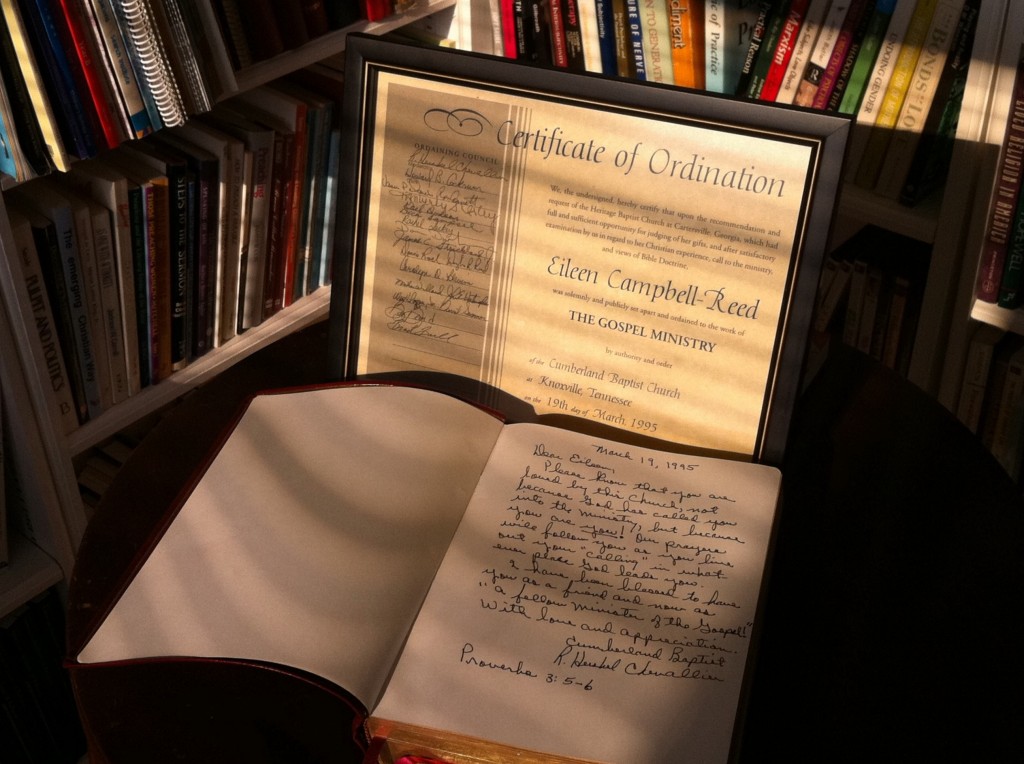A pastor I watched and learned from . . .
In my kind of work you can’t really help but know a lot of pastors. And I feel gratitude, love and respect for most all the ones I know. They do amazing, challenging work and attend to the things in life that matter. I could choose from a wide variety of them to say something about what I’ve learned, but for today I’m choosing just one, the one I knew the longest and whose influence comes into clearer focus as I get further away.*
Hershel – we always called him Hershel because Chevallier (shu-val-ee-ay) was too hard for anyone to say – came to the church where I was growing up when I was in second grade. He moved from Louisiana and we thought he was a Cajun. Some of the old guys teased him and called him Brother Chevrolet. He died several years ago, but for the better part of three decades he pastored the church that nurtured and raised me in faith.
I watched him week after week preach, teach, lead, listen, talk and live his life. I had the usual disillusionments, and in college thought of him as my counter-example for how to preach. That was awfully adolescent of me. I know now that he was a steady, earnest, thoughtful and well-prepared preacher. And the thing about his preaching that stands out most is his love of the story of the Prodigals. We whispered around the church that he had preached from that Luke 15 text more than any other. But we loved it, really.
I have a vivid memory of the Sunday evening when he brought a pair of sandals and put them right on the pulpit. He took off his ring and held it up for us to see. He even brought his clerical robe which he only wore for weddings and other rare occasions. So when he talked about the party for the prodigal son, with the ring, the robe and the fatted calf, we could see just how special it all really was. What was especially clear was how much he loved that story and how it shaped him, how he was both seeking and offering that prodigal father’s love. Hershel did not figure prominently in his own sermons. He was not mostly a story teller in a direct way. He did not work by self-disclosure. And the modesty and sincerity which motivated his choices taught me something.
When I was in seminary and home one spring break, Hershel said, “Hey, let’s ride up to the preachers’ meeting . . . “ Fred Craddock was lecturing about preaching that day. “Sure,” I said. And Scott Irwin and I rode along. Scott was the interim youth minister. I was hoping I might get an interview at another church in my hometown. I did some job networking at that meeting. Scott and Hershel and I talked shop all the way up to the meeting and back. I don’t recall a lot of the conversation. But I remember feeling like I was being treated as a young minister, not just another kid who had grown up in the church. Of course I was practically the only woman at the meeting. And I felt self-conscious most of the time I was there (and hid my feelings under a thin layer of confidence, as was my custom). But riding along with Hershel and thinking I might actually make a go of this ministry thing helped me feel like the hill was not quite so steep. His willingness to see me differently taught me something.
A couple of years later when I had received my first call, my new church asked my childhood church to ordain me. Hershel had been waiting for this moment. He no doubt went through all the right channels and talked it over with the deacons, but I had little doubt that he would find a way for the church to say ‘yes.’ A few folks had threatened to leave the church if they ever ordained a woman. But then most of them had known me since I was three. I wasn’t just any woman. I was a daughter in the church. And not much of a prodigal, but an elder daughter, always there and always responsible. And my parents, in-laws and most of our siblings were there, too.
On the afternoon of the ordination exam I sat in the same Sunday school room where I had practiced Bible drill, rehearsed for children’s choir, attended and later taught Vacation Bible School, and led adult Sunday School on Youth Sunday. It was the same room where for many months or years adults gathered on Wednesday nights for prayer meetings. I had heard Hershel pray over the sick and bereaved. Listened to him teach bible studies, and moderate business meetings. Strangely (for Baptists) we had the custom that the pastor moderated business meetings. He did it well, and I rarely heard any complaint about it.
Now in that same room I was sitting in a folding metal chair behind a brown metal school desk, which held only my Bible. I was surrounded by mostly men. Church deacons. Some as young as my brother-in-law. Some of them deacons as long as I could remember. A few other ordained ministers joined us, including two ordained colleagues from the new congregation where I served. Only three women. One of my new colleagues. A friend from seminary who had joined my home church. And my college professor, Carolyn Blevins. A couple of other seminary friends were also part of the “ordination council.”
And Hershel was there, of course. Like a sentinel. He didn’t say too much. He never did. He was in his usual role as moderator. I responded to questions and tried to speak honestly and forthrightly about my faith and my vocation as a minister. I have no idea what I actually said on that day 16 years ago. When the examination was complete I stepped from the room. They talked and voted, and I was approved for ordination. But in a way I had already been approved by more than 20 years of their watching me grow up and follow a call to ministry. All the while I was also watching what Herschel was doing, and making choices to do things my own way, and yet not without his imprint. His unobtrusive steady presence taught me something.
Members of my new congregation had piled into their cars and the church van after the morning service in Georgia. And they drove up to Tennessee. The sanctuary that evening was full. I kneeled at the end of an aisle where I had walked to join the church. The same aisle where I walked every year for GA and Acteen recognition services. The same aisle I had walked down to meet my husband and make a promise of marriage. Hershel had been there to receive me many of those times when I walked down that aisle. And here he was again welcoming me home.
My pastor had learned over the years that ordinations were at the hands of the church – not just the deacons or the other ordained ministers, but the whole church. So they all came down the aisle that evening: my childhood congregation and my new ‘grown up’ congregation. All their hands touching and blessing me. That was one of most important gifts that came to me that day.
Two other gifts stand out. My new congregation had collected up the money so they could give me my first (and only) liturgical robe and a beautiful set of hand-woven stolls. As I recall, it was Hershel who insisted at the end of the service that I put on the robe so that everyone might see it. Of course he did. It was a homecoming, a welcome, and a blessing. It deserved a robe and a party. I got both.
The other gift was a Bible. Someone, probably my mom, had been assigned to ask me which kind I wanted. New Revised Standard Version, I’d said without hesitation. With the Apocrypha and Oxford Annotated notes. Okay, now we’re talking a fat bible with all that included. Burgundy leather bound. It weighs about 40 pounds. And has my name in gold on the cover.
The best part of that gift, however, is not the weight or the embossing or the Oxford annotations. It’s the note on the inside cover in Hershel’s own hand. It says: Please know that you are loved by this church, not because God has called you into the ministry, but because you are you! Our prayers will follow you as you live out your “calling” in whatever place God leads you. I have been blessed to have you as a friend and now as “a fellow minister of the Gospel!” His words – those spoken and preached, and those said behind the scenes and in hand-written notes taught me something.
In the years that followed my ordination and before his death Hershel told me on more than one occasion, “I have had several ‘sons in ministry,’ but you are the first ‘daughter in ministry’ I’ve been privileged to have.”
Hershel, the privilege was all mine.
*Note: This post is part of a series of personal stories which unpack the list of advice, which I compiled for those considering ministry as a vocation, at the request of Pam Durso, executive director of Baptist Women in Ministry.
8. Watch good pastoral leaders. Get to know them. Ask a lot of questions. Don’t be shy about this. They need to articulate how and why they do what they do, and you need to hear them try to say it. Then try on what you see for yourself. See how it fits. Do it your own way, but don’t ignore the wisdom of those around you.




